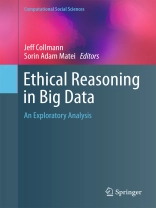This book springs from a multidisciplinary, multi-organizational, and multi-sector conversation about the privacy and ethical implications of research in human affairs using big data. The need to cultivate and enlist the public’s trust in the abilities of particular scientists and scientific institutions constitutes one of this book’s major themes. The advent of the Internet, the mass digitization of research information, and social media brought about, among many other things, the ability to harvest – sometimes implicitly – a wealth of human genomic, biological, behavioral, economic, political, and social data for the purposes of scientific research as well as commerce, government affairs, and social interaction. What type of ethical dilemmas did such changes generate? How should scientists collect, manipulate, and disseminate this information? The effects of this revolution and its ethical implications are wide-ranging. This book includes the opinions of myriad investigators, practitioners, and stakeholders in big data on human beings who also routinely reflect on the privacy and ethical issues of this phenomenon. Dedicated to the practice of ethical reasoning and reflection in action, the book offers a range of observations, lessons learned, reasoning tools, and suggestions for institutional practice to promote responsible big data research on human affairs. It caters to a broad audience of educators, researchers, and practitioners. Educators can use the volume in courses related to big data handling and processing. Researchers can use it for designing new methods of collecting, processing, and disseminating big data, whether in raw form or as analysis results. Lastly, practitioners can use it to steer future tools or procedures for handling big data. As this topic represents an area of great interest that still remains largely undeveloped, this book is sure to attract significant interest by filling an obvious gap in currently available literature.
Table of Content
Part I. Applying a contextual analysis of privacy in Big Data research._A theoretical framework for ethical reflection in big data research.- Part II. Ethical reasoning beyond privacy in Big Data.- The Privacy Preferences of Americans.- Beyond TIA: government surveillance in the post-Snowden era.- Engaging the public in ethical reasoning about Big Data.- The Ethics of Large-Scale Genomic Research.- Neurotechnological Convergence and ‘Big Data:A Force-Multiplier toward Advancing Neuroscience.- Assuring personal privacy on the Internet.- Part III. Institutionalizing ethical reasoning about Big Data.- Technology for Privacy Assurance.- Institutionalizing ethical reasoning: Integrating the ASA’s Ethical Guidelines for Professional Practice into course, program, and curriculum.- Data Management Plans, Institutional Review Boards, and the Ethical Management of Big Data about Human Subjects.- Integrating ethical reasoning into preparation for participation to work in and with Big Data through the Stewardship model.
About the author
Sorin Adam Matei
Purdue University
100 N. University Drive
West Lafayette, IN 46077
Jeff Collmann
Office of the Senior Vice President for Research
Georgetown University
37th and O Streets, N.W.
Washington, DC 20015












